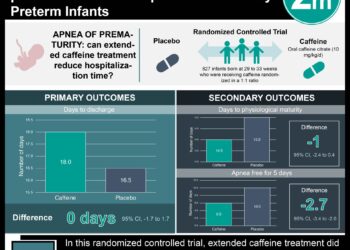Poverty, preterm birth demonstrate additive effect on cognition
1. The combination of poverty and preterm birth had additive negative effects on later cognitive function.
2. Poverty alone was associated with worse cognitive outcomes than preterm birth alone.
Evidence Rating Level: 2 (Good)
Study Rundown: Though poverty and preterm birth have each been independently associated with negative cognitive outcomes for children, little is known about the effect of these 2 factors when combined. In this study, researchers used a United Kingdom national database to assess cognitive deficits in children through various phases of development. They aimed to assess the nature of the exposure to either poverty or preterm birth on later cognition. Researchers assessed cognitive development skills including vocabulary, reading, numbers skills, and pattern construction. The study authors discovered that though the combination of poverty and preterm birth increased the risk of cognitive impairments, the interaction was largely additive rather than multiplicative or demonstrating any modifying effect. Poverty as a single risk factor was more strongly associated with negative cognitive outcomes than preterm birth alone. The study is limited by its largely white, 2-parent home population, which is not generalizable to all families. Despite this limitation, these results suggest the combined negative effects on cognition of preterm birth and poverty, affirming that physicians should be particularly concerned for patients impacted by both
Click here to read the original article, published today in Pediatrics
Relevant Reading: The Effects of Poverty on Children
In-Depth [retrospective cohort]: Researchers utilized data from the Millennium Cohort Study (MCS), a longitudinal study of children in the United Kingdom that included children from the 2000 to 2002 birth cohort. The MCS assessed children at age 9 months, 3 years, 5 years, and 7 years who were singleton births born between 24 and 40 weeks gestation. Socioeconomic status of the family was assessed when the child was 9 months, and poverty was defined as <60% of the median national income. Cognitive outcomes were assessed using the Bracken School Readiness Assessment-Revised (BSRA-R), the British Ability Scales II (BAS II), and the National Foundation for Education Research (NFER) number skills assessment. Areas assessed included vocabulary, picture similarity, pattern construction, and number skills. Of the 13 267 singleton children initially eligible, 10 649 (80%) completed the 3-year assessment, 10 494 (79%) completed the 5-year assessment, and 9521 (72%) completed the 7-year assessment. A total of 81% of participants were white and 83% lived in a 2-parent household. For children born prematurely, cognitive differences varied from no difference to 0.31 standard deviations below the averages of term-born children. At all assessments, children living in poverty scored between 0.2 and 0.4 standard deviations below the those from more affluent families, with no significant interaction discovered between poverty and preterm birth for the majority of outcomes assessments.
Image: PD
©2017 2 Minute Medicine, Inc. All rights reserved. No works may be reproduced without expressed written consent from 2 Minute Medicine, Inc. Inquire about licensing here. No article should be construed as medical advice and is not intended as such by the authors or by 2 Minute Medicine, Inc.







